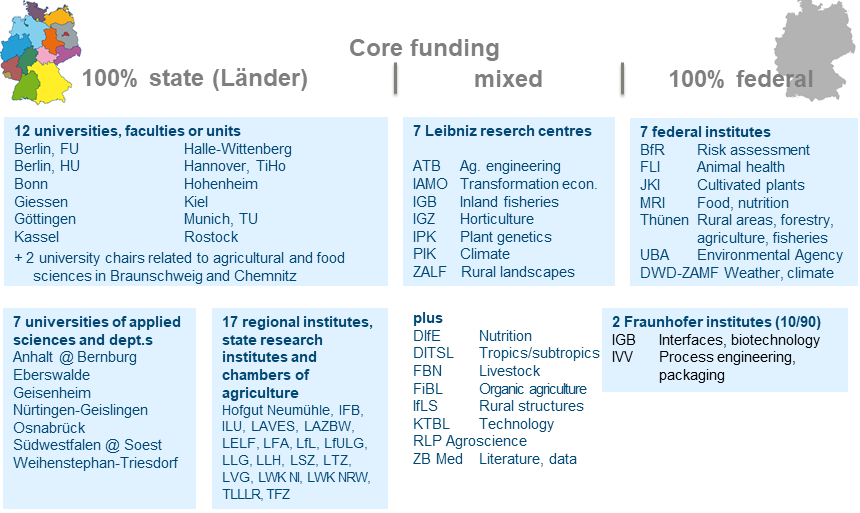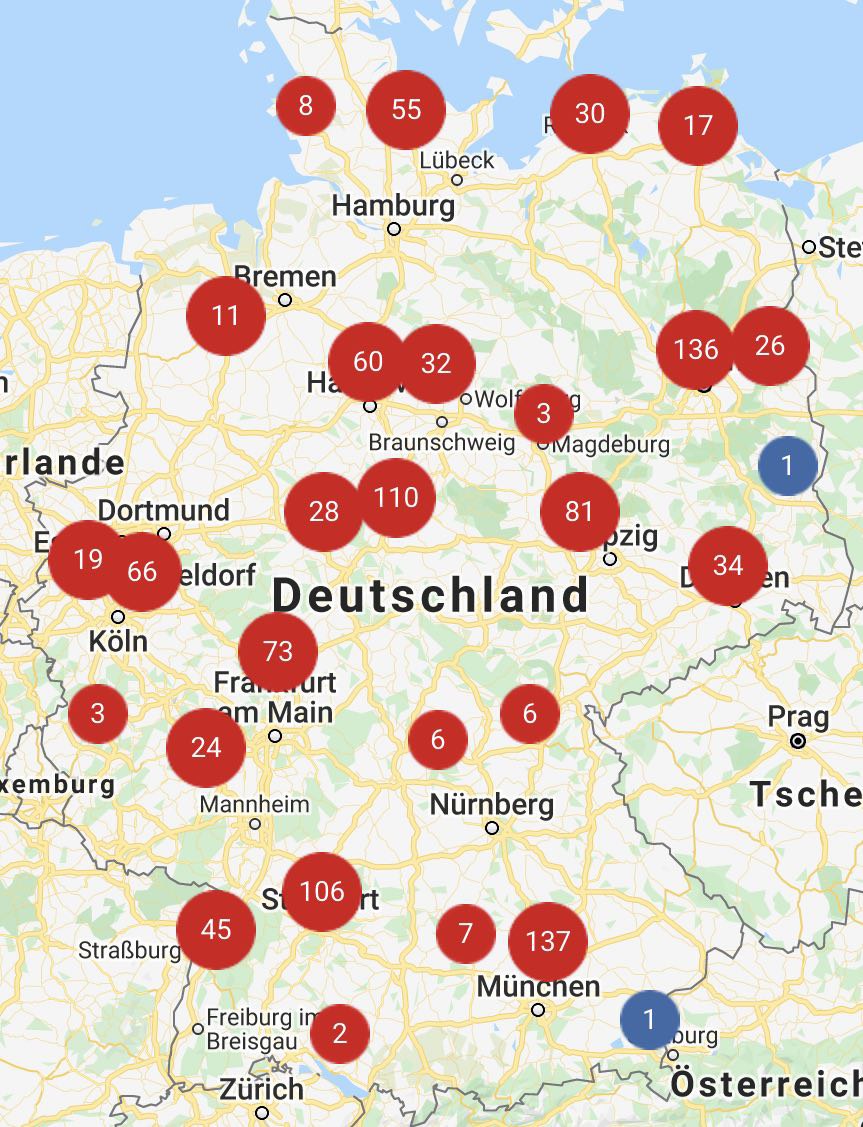A primer on agricultural research in Germany
Germany is a federally structured country; the federal states are known as „Länder“ (singular: Land). This has implications also for the organization of publicly funded agricultural research in Germany.
University research is under the authority of each Land. The federal government and most Länder maintain their own research institutions for policy advice, for information for extension services, and for practitioners. In several states, chambers of agriculture, funded by contributions from farmers and the state governments, also conduct agricultural research. Research institutes with a special thematic focus have mixed funding from federal and state governments and belong to one of several associations (Fraunhofer, Helmholtz, Max-Planck, Leibniz). In addition, there are other research institutes with public funding. Due to the diversity of purposes and responsibilities of DAFA members the strategies developed by DAFA can extend all the way from basic science to application in practice and society.
Member institutions of DAFA
Locations of agricultural research institutions
Funding structures
The largest funder of public research is the federal government. It is funding the research institutions within the portfolios of ministries. Similarly, the Länder fund their own research institutions and support the chambers of agriculture. Federal and state governments jointly fund research centers on specific topics and they fund the German research foundation (Deutsche Forschungsgemeinschaft, DFG).
Beyond basic funding for infrastructure, permanent staff, and statutory work, the institutions can apply for additional (external) funding from research programmes set up by federal and state governments, foundations, industry, EU, and other sources. Relevant foundations for agricultural researchers are Alexander von Humboldt, Robert Bosch and Deutsche Bundesstiftung Umwelt). Companies may also buy research services from public institutions.
Project funding by the federal government, DFG und EU, 2017–2020, for agricultural and food science and related topics. (Source: DFG-Förderatlas 2021 Project funding by federal states, foundations or companies was not considered in the thematic section of DFG-Förderatlas.)
| Project funding in M€/year | Federal government |
DFG | EU |
| Funding area |
Food, Agriculture, Consumer Protection |
Agriculture, Forestry, Veterinary Science |
Food, Agriculture and Forestry, Fisheries, Bioeconomy |
| Full universities and universities of applied sciences | 43 | 36 | 20 |
| Federal research institutes | 16 | 5 | 14 |
| Fraunhofer , Max-Planck, Helmholtz and Leibniz research centres | 15 | 2 | 10 |
| Other institutions | 18 | 2 | 7 |
| Total | 92 | 44 | 51 |
Staff at research institutions for agricultural, veterinary medicine, forestry and food science, 2020. (Source: DESTATIS Tables 21811-0005 and -0007, FS11R4.4)
| Type of institution |
Staff (full-time equivalents) |
| Universities |
13984 scientists 67% technicians 20% other 13% |
| Non-university Research Total | 6226 scientists 47% technicians 16% other 37% |
| Government institutions |
4146 |
| Federal | 2679 |
| Länder (States) and Municipal | 1467 |
| Fraunhofer , Max-Planck, Helmholtz and Leibniz research centres | 1615 |
| Helmholtz-Centres | 0 |
| Max-Planck-Institutes | 408 |
| Leibniz-Institutes | 1169 |
| Other institutions with public funding | 438 |
| Collections, Archives, Museums | 28 |
Earlier survey of staff and funding sources
In 2005 the German Council of Science and the Humanities surveyed 90 agricultural research institutions (WR 2006).
Permanent staff in agriculture, forestry, horticulture and food sciences in 2004
| Professorships | Researchers | |
| Faculties of Agriculture at full-range universities | 450 | 835 |
| Faculties of Agriculture at universities of applied sciences | 340 | 60 |
| Veterinary medicine (only animal production) at universities | 30 | 40 |
| Food sciences at universities | 25 | 30 |
| Research Centres | 40 | 480 |
| Federal research | 10 | 635 |
| State research | – | 410 |
| Total | 895 | 2480 |
External funding [M€] in agriculture and horticulture, average of 2001-2003
| Total | Federal | DFG | EU | Länder | Industry | |
| Universities | 57 | 31% | 25% | 12% | 13% | 16% |
| Research Centres | 20 | 44% | 13% | 13% | 4% | 14% |
| Federal Research | 12 | 43% | 9% | 18% | 12% | 11% |
| State Research | 12 | 21% | 1% | 15% | 20% | 33% |
| Universities of Applied Sciences | 7 | 37% | 1% | 17% | 27% | 9% |
| Total | 110 | 34% | 16% | 13% | 13% | 14% |
Sources of information in English
Projects, institutions and companies with a history in agricultural research
Projects, institutions and companies with a history in agricultural research
Fisaonline.de gives you an overview of research in agricultural and food science, which is financed by public funds. The research aims and areas of the Federal Government and the Länder as well as the related research funding of the public sector are presented here.
Structure of Research in Germany
- Structure of Research in Germany
Information by the German government with an overview of research organisations - GERiT database
Research Institutes in sciences and humanities at universities and research centres
Research infrastructures
RIsources (RI = Research Infrastructure) is a portal operated by Deutsche Forschungsgemeinschaft (DFG, German Research Foundation) containing information about scientific research infrastructures which provide researchers with resources and services for planning and implementing research projects.
Research priorities at universities and colleges
Research priorities at universities and colleges
The German Rectors‘ Conference (HRK) publishes a bilingual Research Map (Forschungslandkarte) that details the key research priorities of higher education institutions. The Research Map allows you to search for the research areas that are of strategic institutional importance for each institution. The research areas can be searched by subject area and by region.
Funding structures in Germany by DFG
Funding structures in Germany by DFG
The Funding Atlas is a series of detailed reports on key figures relating to publicly funded research in Germany published by the Deutsche Forschungsgemeinschaft (DFG, German Research Foundation). The series started in 1996.
Education and Research in Figures
The biennial „Federal Report on Research and Innovation“ is a standard reference work on the German research and innovation policy. Clearly and highly topical, it presents the different elements of the German research and innovation system, with its facts and figures. The report also takes stock of the reforms of the German research and innovation system.
Document search portal for medicine, health, nutrition, environmental and agricultural sciences
Document search portal for medicine, health, nutrition, environmental and agricultural sciences
LIVIVO, the interdisciplinary search engine for life sciences, is provided by ZB MED Information Centre for Life Sciences. Scientifically relevant informations from the ZB MED subjects fields medicine, health, nutrition, environmental and agricultural sciences is bundled and provided on a standard interface for free research.
German Council for Science and the Humanities (Wissenschaftsrat)
German Council for Science and the Humanities (Wissenschaftsrat)
The German Council of Science and Humanities (Wissenschaftsrat) provides advice to the German Federal Government and the State (Länder) Governments on the structure and development of higher education and research.
DAFA – German Agricultural Research Alliance
DAFA congregates the competences of the German, publicly funded agricultural research institutions. Members of DAFA are units at universities, non-university research facilities as well as federal and state research institutes and chambers of agriculture.
DAFA provides solutions for complex questions of great societal relevance and seeks to implement them into praxis. The network aims to increase the capacity and the international visibility of German agricultural research.
DAFA supports the dialogue on research policies between ministries, funding agencies, companies and our members. With our annual Strategic Forum, we address important current topics and seek to foster the capacity of agricultural research in Germany.
DAFA was established in 2011. It is funded by membership fees and a contribution by the Federal Ministry of Food and Agriculture. A governing board of seven persons, elected by the member institutions, leads the alliance.
Expert groups work on great societal challenges and propose research strategies contributing to their solution. The topics for expert groups are suggested by DAFA members or the DAFA governing board and are endorsed by the membership. All concerned stakeholders are invited to contribute to the strategies. After public presentation, drafts of the strategies undergo one or more revisions and are finally adopted by the members’ assembly.
So far, DAFA has set up six expert groups: Livestock, Legumes, Grassland, Aquaculture, Organic Food Production, Bees and Agriculture. Their strategies are published in both, English and German. Research funding programmes by the Federal Ministry of Food and Agriculture have taken up all or parts of the strategies after additional political and administrative considerations. As a result, more cohesive research has been funded in the areas of the expert groups.
The Strategic Forum meets annually to discuss or review the structure and direction of agricultural and food research. Topics are suggested by DAFA members or the governing board. Recent topics for strategic forums, included:
- Changes in land use
- Visions for agriculture in thirty years (2049)
What would agriculture ideally look like and what does it need to get there? - The food of tomorrow?
What are the challenges if production of in-vitro meat and insect proteins are scaled up? - Dimensions of agricultural science
Science is more than merely research – but where is the right balance? - New breeding techniques
What perspectives provide CRISPR/Cas etc. which perspectives are in stock for agriculture? - Big Data and management of research data
Curse or blessing for agriculture? - Foresight agricultural science
What changes do we need now for the future that we want? - Research infrastructures
Large-scale sites and equipment: What do we have, what can we share, what do we need? - Evaluation of applied research
Making the societal and practical impact of research count?
Deutsche Agrarforschungsallianz
c/o Thünen Institut
Bundesallee 50
38116 Braunschweig
Germany



